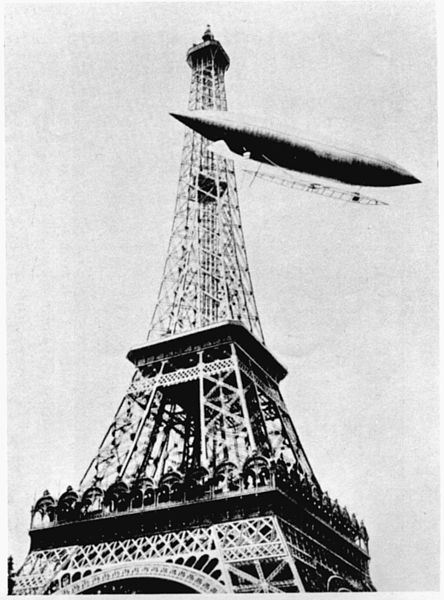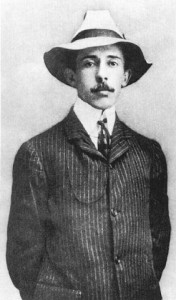
“The enormous crowd…gave the aeronaut a tremendous ovation.”
Alberto Santos-Dumont, a Brazilian aviation pioneer whose chosen vocation was influenced by early reading of Jules Verne, answered a challenge in 1901 to travel around the Eiffel Tower in his airship within 30 minutes. From a report that year in the October 20th New York Times:
“Paris–Santos-Dumont, who rounded the Eiffel Tower to-day in his airship, started for the first time at 2:29, but on leaving the park his guide rope caught in a tree and he was obliged to descend. He started against 2:42 P.M., rose 250 yards and then pointed for the Eiffel Tower, the balloon going in a straight line.
It was seen, through field glasses, to arrive at the tower and round it. The time, up to that point, with the wind in the balloon’s favor, was eight minutes and forty-five seconds. It returned against the wind and made slower headway, but still kept in true direction for St. Cloud, which it reached in the total time of twenty-nine minutes, fifteen seconds.
But, instead of descending immediately, Santos-Dumont made a broad sweep over the Aero Club grounds, with the result that another minute and twenty-five seconds were consumed before the workmen seized the guide rope. Thus, technically, Santos-Dumont exceeded the time limit by forty seconds.
The enormous crowd which had gathered inside and outside the grounds gave the aeronaut a tremendous ovation. As his basket came within speaking distance, Santos-Dumont leaned over the side and asked:
‘Have I won the prize?’

“A number of ladies who were present threw flowers over the aeronaut.”
Hundreds of spectators shouted: ‘Yes! Yes!’ But the Count de Dion, a member of the committee approached and threw a damper on the enthusiasm by saying:
‘My friend, you have lost the prize by forty seconds.’
The crowd, however, refused to accept this view and a warm discussion ensued, the majority of the spectators taking the ground that Santos-Dumont was entitled to the prize.
The aeronaut, after protesting against the decision of the committee, finally shrugged his shoulders and remarked:
‘I do not care personally for the 100,000 francs. I intended to give it to the poor.’
A number of ladies who were present threw flowers over the aeronaut, others offered him bouquets, and one admirer, to the amusement of the onlookers, even presented him with a little white rabbit.”
